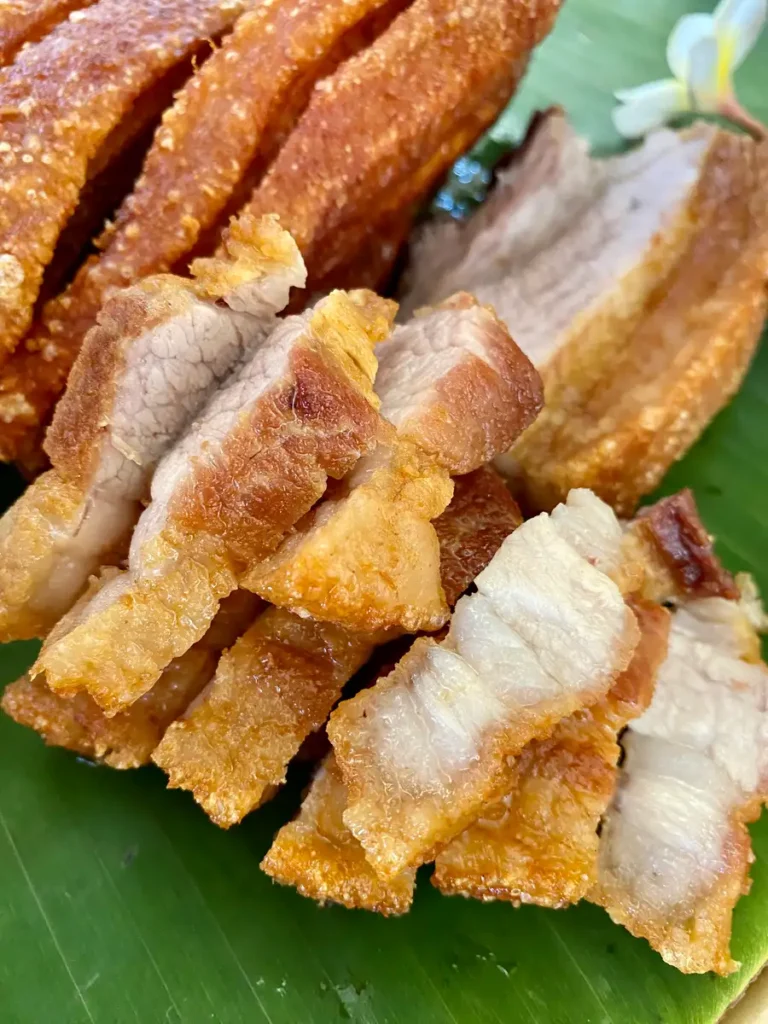Pad See Ew Shrimp Recipe (Thai Fried Noodles)
As an Amazon Associate, I earn from qualifying purchases. Read the full disclosure here .
This pad see ew shrimp recipe makes delicious Thai fried noodles with Chinese broccoli, perfect for a cozy evening meal on both busy weekdays and weekends. It’s an easy stir-fry dish that’s perfect for the beginner home cook, and is prepared with sen yai, also known as fresh wide rice noodles.

What’s great about Thai stir-fries is that you can substitute the choice of protein in almost every recipe. For instance, you can swap the shrimp in this recipe to make beef noodles or chicken noodles. You can also use pork or even add other seafood!
With just one recipe, you can make multiple delicious dinners – how awesome is that?! For more insider tips on cooking the perfect Thai fried noodles, keep reading. If you’re already a pro in the Thai kitchen, feel free to skip right to the instructions and get started!
What is pad see ew shrimp
Shrimp pad see ew is a Thai noodle dish where fresh wide rice noodles are coated in dark soy sauce, stir-fried with shrimp, vegetables like Chinese broccoli, and savory-sweet stir-fry sauce.
In Thailand, this dish is known as pad see ew goong (ผัดซีอิ๊วกุ้ง), where pad means stir-fried, see ew refers to soy sauce, and goong means shrimp.
More about Thai fried noodles with shrimp recipe
Do you ever have those days when you really want to eat something delicious but don’t want to spend hours in the kitchen? Well, yesterday was one of those days for me! Without knowing exactly what I would make, I headed to the local food market, and the fresh shrimp immediately caught my eye.
My husband mentioned he was really in the mood for fried noodles, and luckily, our market always has fresh rice noodles available. These are the classic pad see ew noodles, but if you’re having trouble sourcing them, you can try making homemade sen yai noodles.

Inspired by my husband’s craving for noodles, I decided to make this shrimp recipe – it was simply too delicious not to share!
This recipe includes a tasty stir-fry sauce that’s perfectly balanced. You can serve these noodles to the whole family, even the kids. I like to add some red pepper flakes for a bit of spice.
And as I mentioned earlier, you can also add other proteins or opt for a seafood mix. For a noodle variation, you can use dry rice noodles like those used in pad Thai or even rice vermicelli.
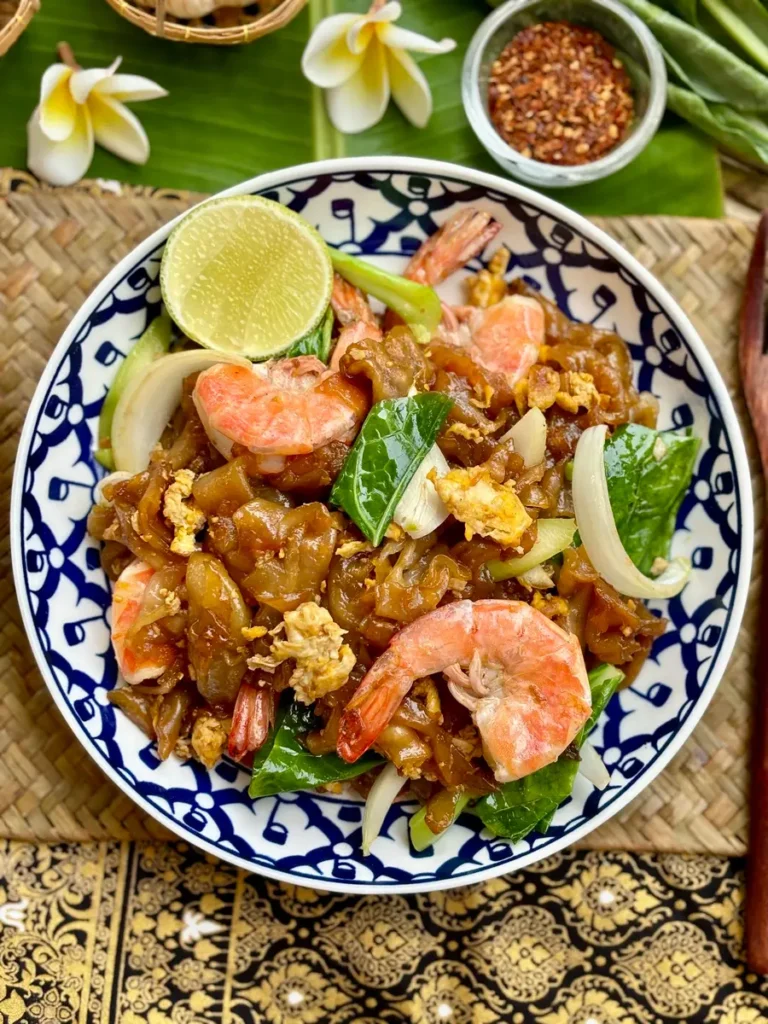
Pad see ew vs pad kee mao
Something that was recently shared with me is that many things that are obvious to me are a mystery to people who are new to the world of Thai food. So before we dive into the ingredients, here’s a fun comparison between two well-known Thai noodle dishes!
- Pad see ew is a classic Thai noodle dish known for its mild flavor. It features wide rice noodles stir-fried with soy sauce, garlic, and typically chicken or pork, along with Chinese broccoli. It’s slightly sweet and very savory, making it a favorite for those who prefer less spicy foods.
- Pad kee mao, also known as drunken noodles, is a spicier noodle dish. This dish combines fried rice noodles with bold flavors like basil, chili, and garlic. It often includes a mix of seafood or meat. Pad kee mao is ideal for those who enjoy spicy food.
Ingredients
Ingredients can be sourced at Asian grocery stores and Asian markets.
The exact measurements are in the recipe card at the end of this post.
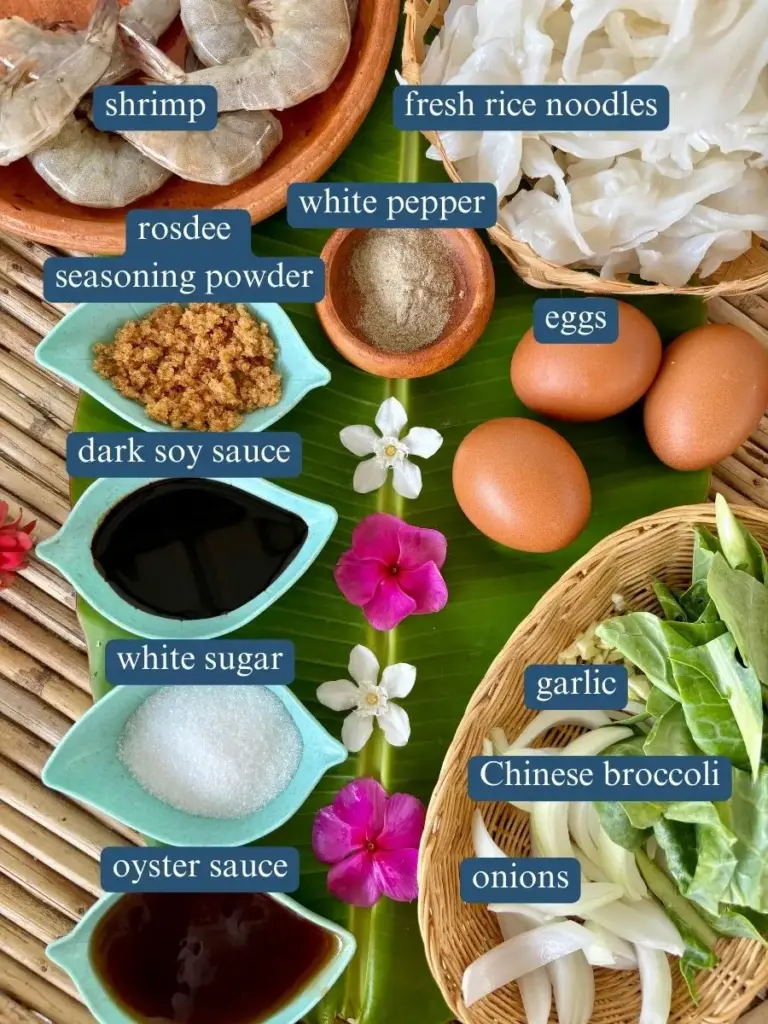
- Shrimp – Opt for black tiger shrimp or jumbo shrimp.
- Fresh wide rice noodles – Also known as sen yai, these noodles are thick and chewy, and perfect for soaking up the Thai fried noodles sauce.
- Black soy sauce – A key ingredient in this recipe, black soy sauce is a darker and sweeter version of regular soy sauce that adds color and a rich flavor.
- Oyster sauce – Oyster sauce is a thick, savory sauce made from oysters, adding a deep umami flavor to stir-fries and marinades.
- Rosdee seasoning powder – Rosdee seasoning powder is a popular Thai seasoning that adds a salty, savory boost to any dish. You can get the pork or chicken flavor, both are fine to use.
- White sugar – Sugar is essential for balancing out the savory flavors.
- White pepper
- Chinese broccoli (gai lan)
- Onion
- Garlic
- Eggs – Eggs add richness and texture, often scrambled into Thai noodle stir-fries for added protein and flavor.
- Oil – Use a neutral oil like canola oil or vegetable oil.
How to make pad see ew shrimp
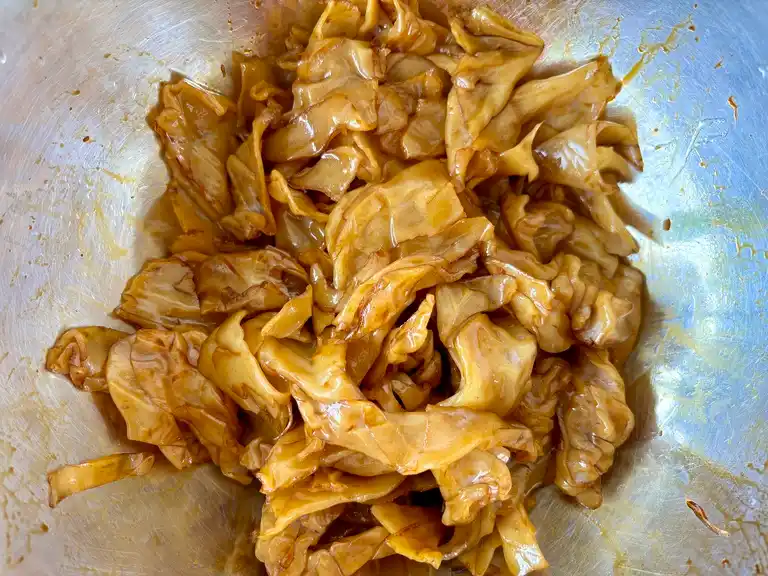
Step 1: Toss the fresh wide rice noodles with dark soy sauce in a bowl until they are thoroughly coated.
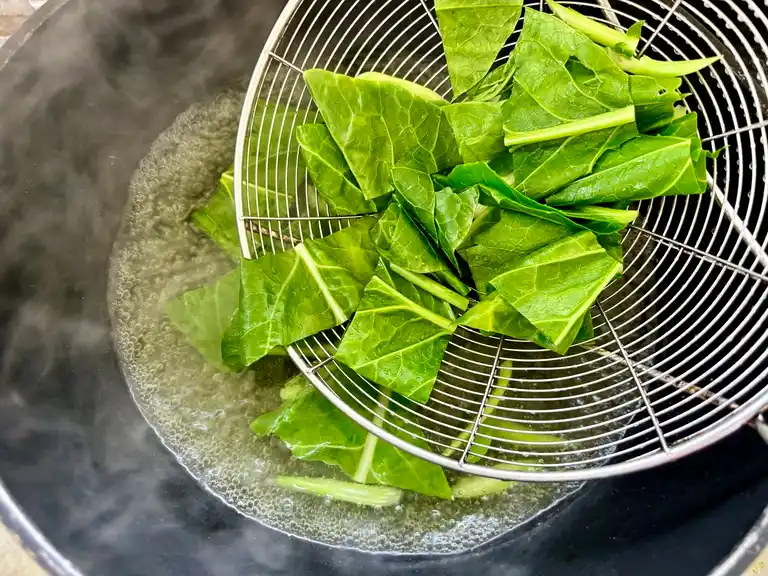
Step 2: Quickly blanch the chopped Chinese broccoli in boiling water for 30 seconds, then drain them.
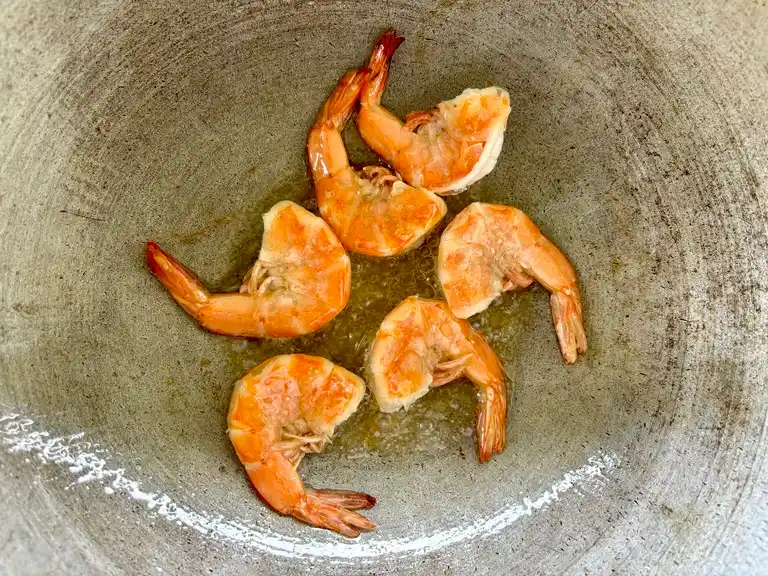
Step 3: Heat oil in a skillet over medium heat and sauté the shrimp until they are fully cooked. Remove the shrimp and set them aside, but keep the oil in the skillet.
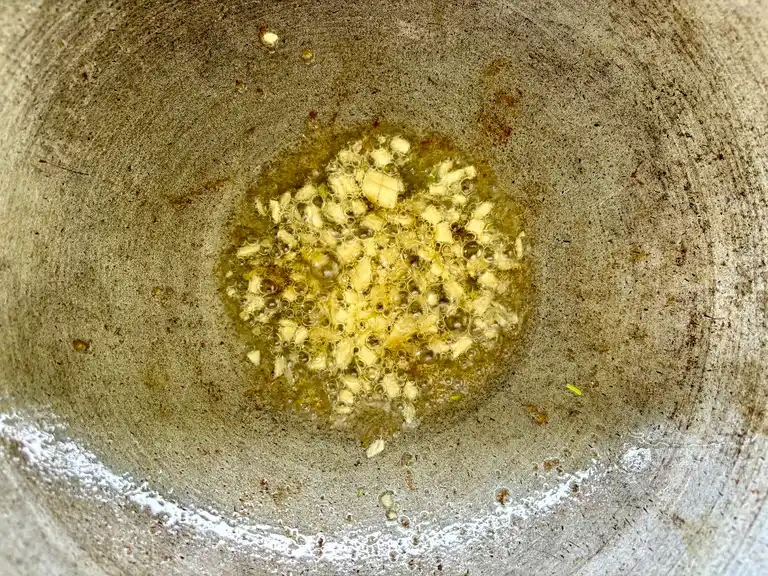
Step 4: Add garlic to the same skillet and sauté until golden and aromatic.
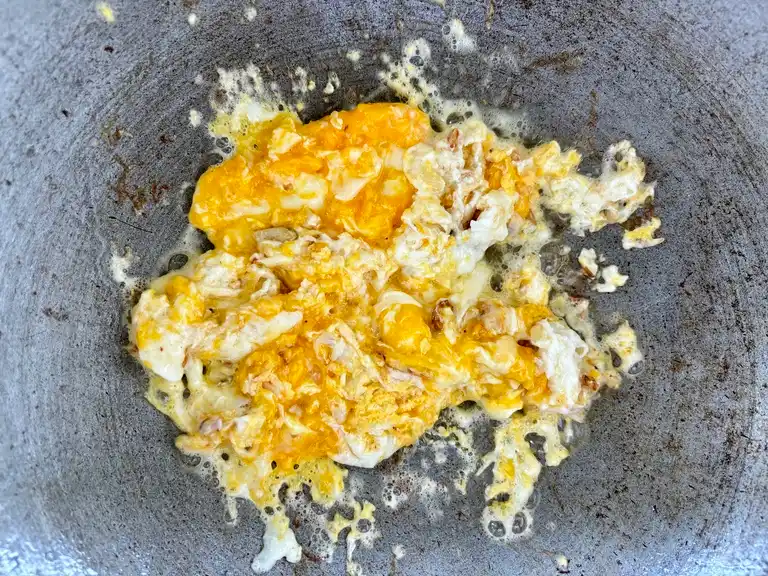
Step 5: Crack the eggs into the pan and scramble them until they’re fully cooked.
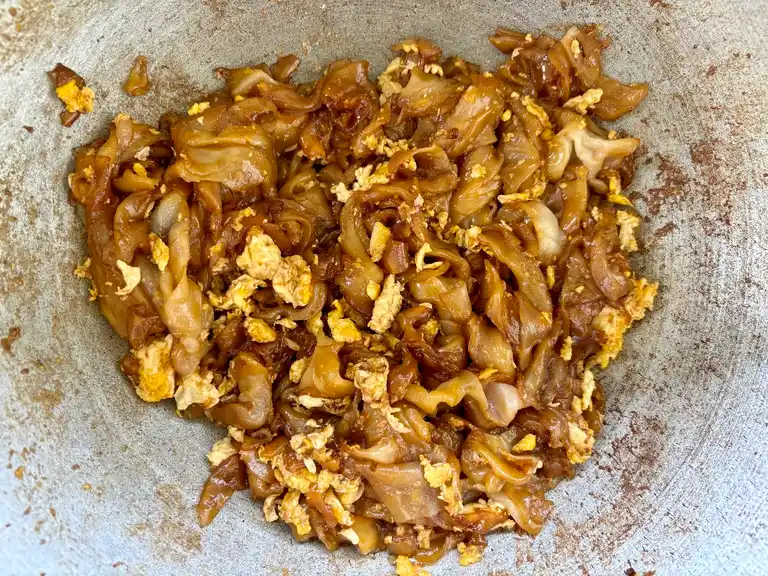
Step 6: Add soy-sauce-coated wide rice noodles along with oyster sauce, white pepper, white sugar, and rosdee seasoning powder. Stir everything together and cook until the noodles are tender.
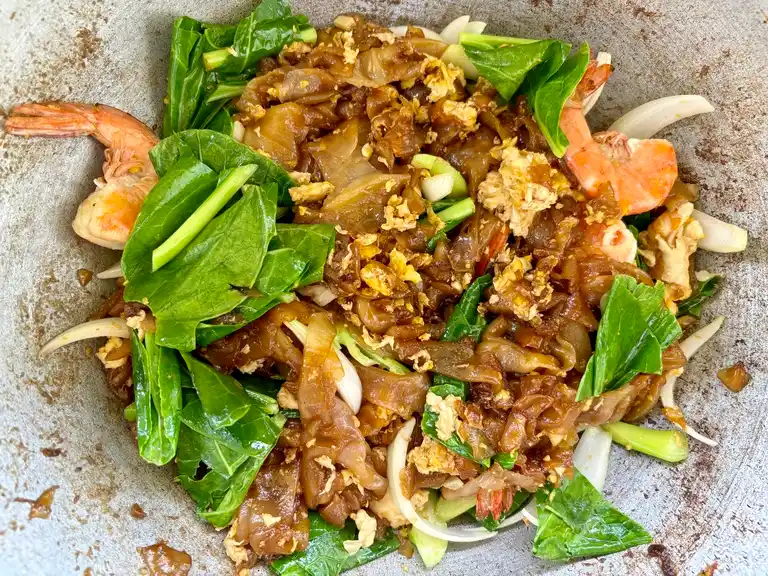
Step 7: Return the cooked Chinese broccoli and shrimp to the skillet, add sliced onions, and toss everything together. Serve hot and enjoy!
Kitchenware
- Measuring spoons and cups
- Cutting board and a sharp knife
- Mixing bowl (for tossing the noodles with dark soy sauce)
- Large wok or skillet
- Spatula or tongs
What to serve with wide rice noodle stir-fry
In Thailand, this shrimp stir-fry is sometimes served with additional condiments such as white sugar, Thai pepper flakes, and Thai chili vinegar. These condiments allow you to customize the flavors according to your preference.
Noodles with shrimp leftovers tips
Storing: Allow the leftover noodles and shrimp to cool to room temperature. Then, transfer the leftovers to an airtight container and place the container in the refrigerator. Properly stored, Thai shrimp noodle leftovers can last up to 3 days in the fridge.
Reheating: For the best texture, reheat your leftovers on the stovetop. Simply heat a skillet over medium heat and stir until hot.
Authentic Thai shrimp recipes
- Thai shrimp lettuce wraps
- Pork and shrimp wonton
- Tom yum kung (spicy Thai shrimp soup)
- Koong karee (shrimp yellow curry stir-fry)
Loved reading this pad see ew shrimp recipe? Please make my day by dropping a star rating and/or a comment below! Follow me on Facebook, Instagram, and Pinterest.
Pad See Ew Shrimp Recipe (Thai Fried Noodles)

Ingredients
- 500 g fresh wide rice noodles, separate before stir-frying
- 15 ml dark soy sauce
- 30 ml oil
- 10 medium shrimp, peeled and deveined
- 2 cloves garlic, minced
- 3 large eggs
- 30 ml oyster sauce
- 20 g white sugar
- 2 g white pepper
- 10 g rosdee seasoning powder, see notes
- 100 g Chinese broccoli, roughly chopped
- 1/2 onion, chopped
Instructions
- Toss the fresh wide rice noodles with dark soy sauce in a bowl until they are thoroughly coated.500 g fresh wide rice noodles, 15 ml dark soy sauce
- Quickly blanch the chopped Chinese broccoli in boiling water for 30 seconds, then drain them.100 g Chinese broccoli
- Heat oil in a skillet over medium heat and sauté the shrimp until they are fully cooked. Remove the shrimp and set them aside, but keep the oil in the skillet.30 ml oil, 10 medium shrimp
- Add garlic to the same skillet and sauté until golden and aromatic.2 cloves garlic
- Crack the eggs into the pan and scramble them until they’re fully cooked.3 large eggs
- Add soy-sauce-coated wide rice noodles along with oyster sauce, white pepper, white sugar, and rosdee seasoning powder. Stir everything together and cook until the noodles are tender.30 ml oyster sauce, 20 g white sugar, 2 g white pepper, 10 g rosdee seasoning powder
- Return the cooked Chinese broccoli and shrimp to the skillet, add sliced onions, and toss everything together. Serve hot and enjoy!1/2 onion
Notes
- Use the nutrition card in this recipe as a guideline.
- Rosdee seasoning powder – Rosdee seasoning powder is a popular Thai seasoning that adds a salty, savory boost to any dish.





